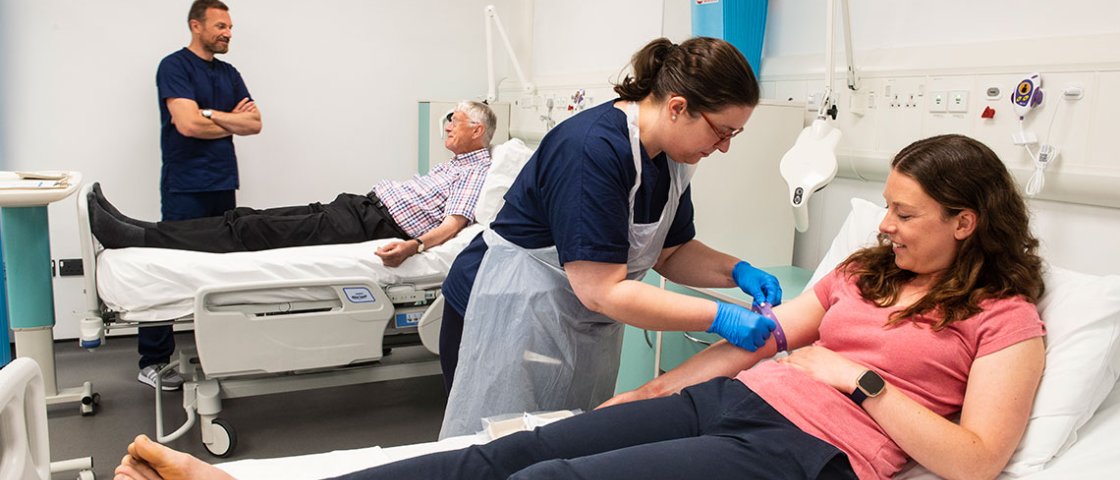

Frequently asked questions
Become part of something that can change the world, take part in a research study.
General
Clinical research is how we create new innovative treatments, increase our medical and scientific knowledge, and develop better patient care for us and future generations.
It is able to show us:
- If a new treatment is safe to use in humans
- If the treatment works
- If the treatment does work, is it better than the treatment that is currently being used and are there fewer side effects
Without clinical research, we would not have treatments such as vaccines and pain medications.
A clinical research facility is a purpose-built unit that is specially designed to run clinical trials/clinical research studies ranging from outpatient visits to high intensity, residential stays.
Clinical research facilities are an environment where specialist support staff from both NHS Trusts and Universities can work together on both volunteer and patient studies.
There are many benefits of volunteering for clinical trials/clinical research studies. Healthy volunteers may choose to participate to contribute to science and the understanding and medical knowledge of certain conditions. For patients, volunteering may also help the treatment of their condition and access better care. Volunteering in a clinical trial/clinical research study is a personal choice and everyone has the right to withdraw at any time. Occasionally, the health tests carried out during the study may identify medical conditions of which you were previously unaware; these may be shared with your doctor for further discussion.
Clinical trial/clinical research studies are carefully designed, approved, and monitored to reduce any risks to volunteers. Our staff all work to Good Clinical Practice (GCP) standards and volunteer safety is the main concern. Every study is reviewed and approved by an independent ethics committee; they are responsible for ensuring the protection of the rights, safety, and wellbeing of all volunteers. In the CRF, our studies are conducted under the strict supervision of qualified doctors and nurses.
We undertake trials/studies in various research areas, including cardiovascular, circadian rhythms, dermatology, medical devices, infectious diseases, nutrition, oncology, sleep/wake, and vaccines. Studies can be either interventional (for example, giving a medicine or other treatment) or observational (for example, watching sleep patterns without giving any treatment).
Recruitment
The CRF holds a recruitment database of volunteers interested in participating in clinical trials/clinical research studies. Signing up to our database is voluntary and you may be contacted, usually via e-mail, to let you know about trials/studies you may be suitable for.
Your details will be kept in accordance with GDPR and if you would like further details about this, please refer to our privacy notice. If you take part in a trial/study, we assign a unique reference number (trial/study number) to you and use this to identify your data instead of your name.
Please refer to our privacy notice.
It is up to you to decide to join the trial/study. You are free to withdraw at any time, without giving a reason. This will not affect the standard of care you receive. You should only volunteer if you have the time to complete the whole trial/study. If you decide to withdraw, you may be asked to return to the CRF for a final follow-up visit.
If your contact details have changed or you no longer want to be registered with us, please contact the recruitment team via our e-mail crc-recruitment@surrey.ac.uk.
Some trials/studies provide both compensation for your time and travel, however this is trial/study dependent. These payments may be liable to income tax and affect any benefits you may receive. This payment should be declared to HM Revenue & Customs under self-assessment, but please be aware declaring the payment as income is the responsibility of the volunteer and not the responsibility of the CRF. Please note if you are on the University of Surrey payroll, you will be paid through this method and tax deductions may be made. Please also be aware that payments can take up to two weeks to be paid following the completion of a trial/study.
If you have any further questions, please contact the Recruitment Team:
Tel: 0800 269847
Email: crc-recruitment@surrey.ac.uk
You cannot take part in too many trials/studies because it may impact your health. Normally you must have a gap of three months between trials/studies. For this reason, we and other units like ours in the UK keep a database of healthy volunteers and record when they take part in trials/studies. Therefore, you may be registered on the TOPS (“The Over volunteering Prevention System”) database with your National Insurance (NI) number (if you are a UK citizen), your passport number and country of origin (if you are not a UK citizen) and the date of your last dose of study medicine.
If you withdraw from the study before you receive any trial/study medicine, the database will show that you never received a dose. Only our staff and other medicines research units access the information in the database and only with your consent. We may call other units, or they may call us, to check your details.
Visits
Every trial/study has different requirements, but below are some examples of what you may experience.
Screening allows us to check whether you meet the requirements of a trial/study and if you are eligible to take part.
First, we may go through a telephone questionnaire with you, as an initial check to make sure you meet the broad criteria. If you pass this stage, you will be invited to a screening appointment at the CRF. You will be sent an information sheet prior to this visit. The length of this appointment depends on the trial/study, and you will be informed of the duration before your visit. You must arrive at your scheduled appointment time to ensure staff are available to see you. If you are running late, please contact us to let us know.
At a screening appointment you will meet the clinical team and doctors. They will ensure that you are fully informed about the trial/study and will answer any questions you may have. You will then be asked to consent for the trial/study and if you decide to do so, you will undergo some screening tests, such as measuring height or weight, completing questionnaires, taking vital signs, heart checks, and having a blood sample collected. Screening tests differ between trials/studies.
If you do not pass all the screening tests for the trial/study during the visit, we will tell you there and then. If you complete the full screening visit, you will be contacted at a later date by the clinical or recruitment teams to let you know the outcome. This is because some screening test results may take a few days to come back, and we need to review all of them.
Outpatient visits will take place during the daytime or evening, and it is important that you make sure you arrive at your scheduled appointment time to ensure staff are available to see you. If you are running late, please contact us to let us know.
You may be asked to follow some trial/study restrictions prior to this visit such as maintaining a food diary or sleep schedule, avoiding certain foods, caffeine, or alcohol, or fasting prior to the appointment. You will not usually be able to bring any other people (including children) to your appointment. During the visit, you may be asked to complete questionnaires and we may perform some tests on you, such as taking blood, a physical exam or measuring height and weight.
Some of our trials/studies require overnight stays at the CRF. Depending on the trial/study you may stay in one of the sleep laboratories, the Living Labs or on our ward. Towels and bedding are provided, but we would ask you to bring nightwear and slippers (or something to cover your feet). Please also bring toiletries and something for you to do during the stay (depending on the study you may be allowed to bring electronic devices). The CRF has Wi-Fi, which you can use if the trial/study allows. Participant lounges are available and use of these is permitted on a study-by-study basis. The Clinical Research Building (including the CRF and SSRC facilities) is a non-smoking environment and this includes the use of vapes. While you are at the CRF, you will need to follow trial/study requirements, and this will be outlined to you.



